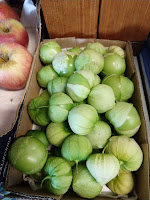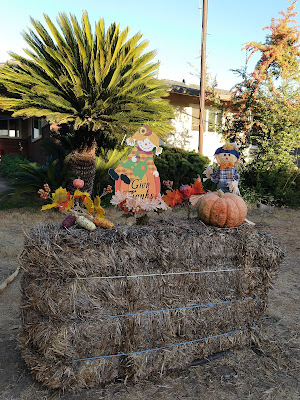How quickly November is progressing. Soon it will be Thanksgiving. Time to gather with family and friends.
Tosh and I are now putting in our long days and nights making hoshigaki and organizing mail order requests. The farm stand is closed on Mondays but I still find myself there tending the dried persimmons. You may contact us for on-farm pick-up orders by calling (916) 791-1656 or email at otoworchard@yahoo.com. For mail orders please use our mail order form. Mail order shipments usually begin in December.
The trees have noticed the change in night time temperatures. Many of the persimmon trees are displaying vibrant orange, yellow, purple and red leaves. Nice time for a walk in the orchard.
Please note: We will be closed on Thanksgiving Day. Regular hours will resume on Friday Nov. 24, 2023.
HOURS:
Tues through Sat 10:00 am to 6 pm
Sunday 11:00 am to 5:00 pm
CLOSED ON MONDAYS
Here is what we have at the Farm Stand from Otow Orchard
Hoshigaki: These are whole dried persimmons. They were hand massaged while they dried over a period of four to eight weeks. Some are firm, others are soft and moist. All are coated with naturally formed white persimmon sugar. No sugar added and no preservatives used. We began peeling persimmons in October. The early hoshigaki is available. You may contact us for on-farm pick-up orders. (916) 791-1656 or email at otowochard@yahoo.com. For mail orders please use our mail order form . Mail order shipments do not usually begin until December.
Apples:
Fuji: Known for being sweet juicy and always crisp.
Reinete Simerenko: a green sweet-tart apple with great flavor. I call it a cider apple.
Granny Smith: A green sweet tart apple. Popular pie apple. Special characteristic is that it stays white after being cut, it does not turn brown after being cut.
Arkansas Black: Amazingly deep red black apple. I call it the "Sleeping Beauty " apple. Sweet and very firm.
European Pears:
Comice : Large, juicy, sweet pear when ripe. Wait for the skin to turn slightly yellow. Similar to a Bartlett pear.
Asian Pears:Shinko: Large round pear with brown skin. Very sweet, crisp, and juicy, a good keeper.
Olympic: Large, dark brown, round Asian pear. It has a good crunch and the flavor is intense. It is juicy and very sweet. Can be used for pies and cobblers.
Okusankichi: Large winter Asian pear. It is a good keeper. It is sweet with a hint of tartness. Juicy and crisp.
Persimmons:
Hachiya: Tall acorn-shaped persimmon. It is astringent until soft and jelly-like. It becomes very sweet soft and delicate. Fresh eating right out of its skin or often used for baking cookies and pudding. Used for making hoshigaki.
Gyombo: Tall Acorn-shaped persimmon with grooves down the four sides of the fruit. Like the Hachiya persimmon, it is astringent until soft and jelly-like. It becomes very soft, juicy, and sweet.
Fuyu:
Apple type persimmon. Can be eaten hard and crisp. These are always
sweet and a favorite among our customers and future customers. At this
time of year they are hard and crisp. Later in the season or if held
for a period of time they will become more orange-red and the flesh will
become tender and sweeter. Used for fresh eating and in salads. Currently being sold by the bag and the box.
Maru, Chocolate, and Nagamaru: These are the brown fleshed persimmons. Back in April when the trees were in bloom, the bees were buzzing. If the flower was fully pollinated, seeds would form and give off
ethylene gas to make the flesh brown and sweet. The problem arises
when a flower is only partially pollinated and less than half of the
seeds form. This fruit will be only partially sweet. It's always a
risk. We recommend cutting the fruit and eating only the brown, sweet
flesh. Some varieties will sweeten as they soften.
If the flower was fully pollinated, seeds would form and give off
ethylene gas to make the flesh brown and sweet. The problem arises
when a flower is only partially pollinated and less than half of the
seeds form. This fruit will be only partially sweet. It's always a
risk. We recommend cutting the fruit and eating only the brown, sweet
flesh. Some varieties will sweeten as they soften.
⚘ Calendula Salve and Lip Balm: Wonderfully thick salve for healing dry skin, bug bites and scrapes. Currently out of stock.
Cherry Tomatoes: We are still getting a few Sun Gold cherry tomatoes. It won't be for long. The days are getting too short and cold. Limited supply.
Chili Peppers: Aji Amareto, Buena Mulata, Jalapenos, ---All limited supply.
 Tomatillos:
These look like small green tomatoes in a paper shell. They can be
cooked or eaten raw. You can add them to salads or make them into green
salsa.
Tomatillos:
These look like small green tomatoes in a paper shell. They can be
cooked or eaten raw. You can add them to salads or make them into green
salsa.
Sweet Peppers: Green, yellow and purple varieties.
Winter Squash:
Red Kuri, Black Futsu: Known as a Japanese pumpkins. These varieties have sweet, thick dry flesh. They can be steamed, baked, roasted, sauteed or added to soups and stews.
Butternut
Squash: One of the most popular winter squashes because of its
generous flesh. The seeds are contained in the bulbous end and the neck
is all flesh. It has a sweet nutty flavor. Is can be roasted,
steamed, baked and chopped into soups, stews, casseroles and curries.
Flavor can be savory or sweetened with syrup and butter.
Quince:
This fruit is firm and seldom eaten raw. It has a pleasing fragrance
which can be preserved by making sauce, jams, jelly, adding it to apple
dishes, and pairing it with pork. It is a great source for pectin.
Quince must be cooked and cored. It is
famously used to make Quince sauce or Doulce de Membrillo, and Quince candy. For Thanksgiving it is a tradition in our family to add quince to the cranberry sauce. Wow.
Pomegranates: Sweet White Pomegranates and tart red Wonderful Pomegranates.
English Walnuts: In the shell. You have to crack them.
Here is what we have from other producers:
WoodRose Country Garden in Granite Bay, organic practices:
Eggplant, beans, colorful bell peppers, garlic and arugula.
Seasoning: basil, rosemary,
oregano, thyme, fresh garlic
Cherry tomatoes.
Winter squash: Pink Banana Squash,
Top O' the Hill Apiary in Granite Bay: Bees wax 🐝.
Sunnyslope Farm Conventional practices, Garanite Bay, CA: Fuji Apples.
Kijani Farm in Granite Bay, organic practices:
Sweet 100 cherry tomatoes
Kabocha, Japanese winter squash (pumpkin). Butternut winter squash
Mihara Farm conventional farming in Newcastle, CA: Kiwi, Hachiya persimmons.
Stoney Point Farm, Organic certified, Loomis, CA: Hachiya persimmons.
Placer County Master Gardeners: 2024 Gardening Guide and Calendar. Provides helpful hints throughout your gardening year.
Lupi Farm in Granite Bay, no spray: Quince. 







No comments:
Post a Comment